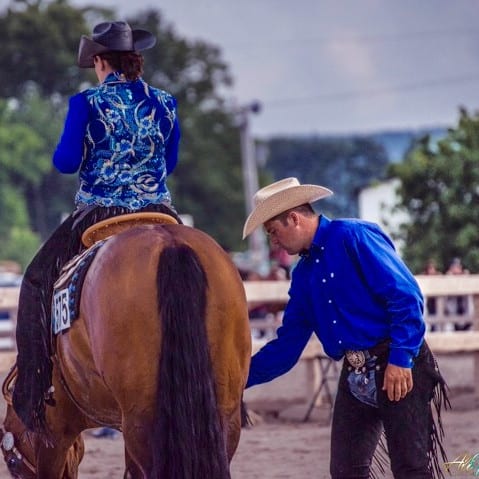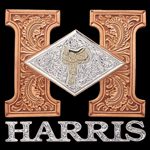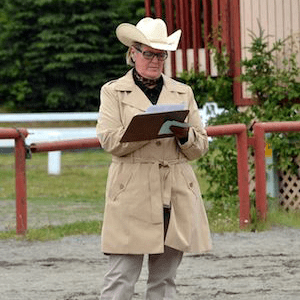What would you find if you could read your trainer’s mind? You know the feeling – you just rode by your trainer on the rail and totally missed their message; did he say more leg? Did she tell me to sit down or sit up? Perhaps you’re lined up for halter, and your trainer’s hand signals look like he may as well be play-calling at a baseball game. It’s in those moments that most showmen wish they could read their trainer’s mind.
So, GoHorseShow asked renowned trainers Holly Hover, Julian Harris, Brent Maxwell and Buddy Laney this question: If you could communicate with your clients via ESP, what thoughts would they most likely find running through your brain as they compete in the show pen?
The answer was a mixed bag – from silly quips (Maxwell, for example, shared that he’s been known to say, “Don’t fall off because I’m not taking the walk of shame to pick you up”) to serious steps to success (Hover explained the sports psychology train of thought she tries to instill in her clients). We combed through the advice, which varied widely by discipline, and boiled it down to a countdown of the top five thoughts you’d find tumbling around in your proud trainer’s head as you go out there and give it your all.
5. Rely on your program and follow the plan
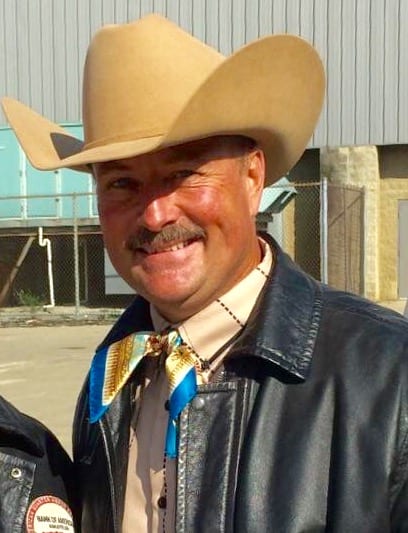 In the midst of the nerves and excitement, it’s easy to lose sight of where you’re going and where you’ve been – sometimes literally in pattern classes. Maxwell (pictured right) notes that’s most often when he wishes for ESP. “When you see that they’ve forgotten the plan, and the pattern has now become a freestyle event with excellent maneuvers in all the wrong places, it would be nice to be able to pause the process and send them in the correct direction.”
In the midst of the nerves and excitement, it’s easy to lose sight of where you’re going and where you’ve been – sometimes literally in pattern classes. Maxwell (pictured right) notes that’s most often when he wishes for ESP. “When you see that they’ve forgotten the plan, and the pattern has now become a freestyle event with excellent maneuvers in all the wrong places, it would be nice to be able to pause the process and send them in the correct direction.”
Harris’ clients would hear a repeated mantra of “Rely on the program” running through his head. When he sees clients’ confidence start to shutter, Harris always suggests to “have faith in your program and your horse; take a deep breath and believe in the process that got you there, to begin with.”
The trainers offered discipline-specific advice, too. While Hover is watching western riding, her thoughts are likely revolving around keeping the horse’s shoulders up; whereas if it’s showmanship, you’d probably hear her thinking, ‘Enjoy it! Don’t make it so mechanical.’ As Laney stands outside the halter pen, you’d sense a warning about the fine line between under-showing or over-showing via his ESP. He admits a sixth sense mode of communication would be helpful. “If we had that, or had a wire between us, I’d probably be telling you to pull his nose up a bit or to get his ears up a little. It’d be the details.”
4. Did you do your homework?
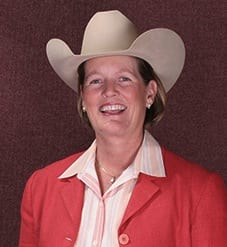 As much as they try to prepare you themselves, there are times when your trainers just need you to buckle down and do your homework, which, if you’re off-pattern or letting the details get the best of you, might be what you hear running through their minds. “The pattern classes are where I see mistakes from not having done enough homework. Exhibitors need to ride the approach, the execution, and the departure of every maneuver. A lot of times they slap the maneuver on the horse at the moment. They forget the mental and physical preparedness of executing soundly – not thinking through the maneuvers like they would have at home,” Hover says.
As much as they try to prepare you themselves, there are times when your trainers just need you to buckle down and do your homework, which, if you’re off-pattern or letting the details get the best of you, might be what you hear running through their minds. “The pattern classes are where I see mistakes from not having done enough homework. Exhibitors need to ride the approach, the execution, and the departure of every maneuver. A lot of times they slap the maneuver on the horse at the moment. They forget the mental and physical preparedness of executing soundly – not thinking through the maneuvers like they would have at home,” Hover says.
Maxwell concurs, explaining, he teaches clients to keep a mental checklist for maneuvers or transitions. “That list not only includes how to prepare the horse but reminders about rider position as well. When watching, I find myself riding every step with them.”
He admits that neither the list nor ESP can prepare a rider for everything, remembering a time when, just as a customer was closing the trail gate, a gust of wind blew the judges’ table cover straight out and jostled everything beneath it. At that moment, his rider would have only heard, “This is not going to be good,” via ESP (and, in fact, that’s exactly what can be heard on the video replay of the event).
One of the homework assignments, according to Laney, is to not rely on having shown in the past. “They don’t get geared up enough before the first show…they get in the pen, and that’s when they figure out they have a problem,” he says.
3. Build on successes – even the littlest ones
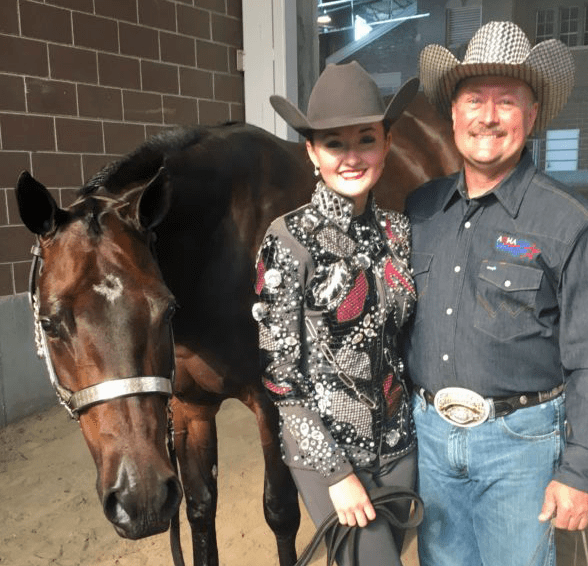 It’s easy to beat yourself up when things don’t go perfectly, but all four trainers agreed to keep your sights set on the present and to not get in your head. “Stay in your bubble. Don’t look at the all-around points. Don’t worry about who’s here. Stay focused on you and your horse and the pattern or class you need to perform. Don’t ask more of your horse than he can give today,” Maxwell says.
It’s easy to beat yourself up when things don’t go perfectly, but all four trainers agreed to keep your sights set on the present and to not get in your head. “Stay in your bubble. Don’t look at the all-around points. Don’t worry about who’s here. Stay focused on you and your horse and the pattern or class you need to perform. Don’t ask more of your horse than he can give today,” Maxwell says.
Hover explains how this is especially important with exhibitors at the start of their careers, whether youth or novice. “Be happy with baby steps and small victories and build on that; a horse show career is not made in one showing. The good ones work on it for years,” Hover says. She recommends clients build on each show throughout the season and explains that trainers expect a peak in performance toward the end of the season, not at every show.
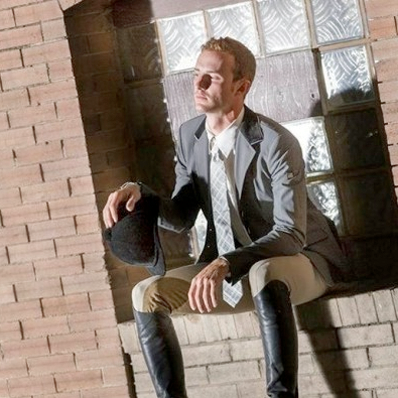 Both Laney and Harris suggest exhibitors take advantage of the learning opportunities trainers and seasoned exhibitors provide. “Most people will watch the professionals and see how we do it; most people will catch on pretty quick,” Laney says.
Both Laney and Harris suggest exhibitors take advantage of the learning opportunities trainers and seasoned exhibitors provide. “Most people will watch the professionals and see how we do it; most people will catch on pretty quick,” Laney says.
Meanwhile, Harris (pictured left) encourages customers to not only learn by viewing but to ask questions, too. He encourages them to take what they learned back to their trainer for further explanation. “Watch those riders that you see and whose horses you enjoy watching go around. Stalk them if you have to,” he jokes. “But anyone will respond to someone with a question. Then take that, go back to your trainer and ask ‘how does this connect’? Being able to understand different styles of riding and training helps you become a better rider yourself.”
Perhaps nothing is more visible in the show pen than the oh-so-nervous showman. If that’s you, a look into Maxwell’s thoughts may be just the comic relief you need at the moment. “Breathe. You don’t look good when you’re blue.” But this is where Hover offers her sports psychology thinking. “You need to think of yourself as a team and as your friend, and you are there as a teammate to help your horse become the champ in that class. When you take the pressure off yourself and turn yourself into your horse’s cheerleader, then you think, what do I need to do to get a plus on that maneuver? What can I do to help my horse receive the accolades that it should in this class? It takes the pressure off ‘me, me, me’ and helps your teammate succeed,” Hover says.
And the number one thing your trainers have running through their mind as you are showing…
1. Remember, you’re here to have fun
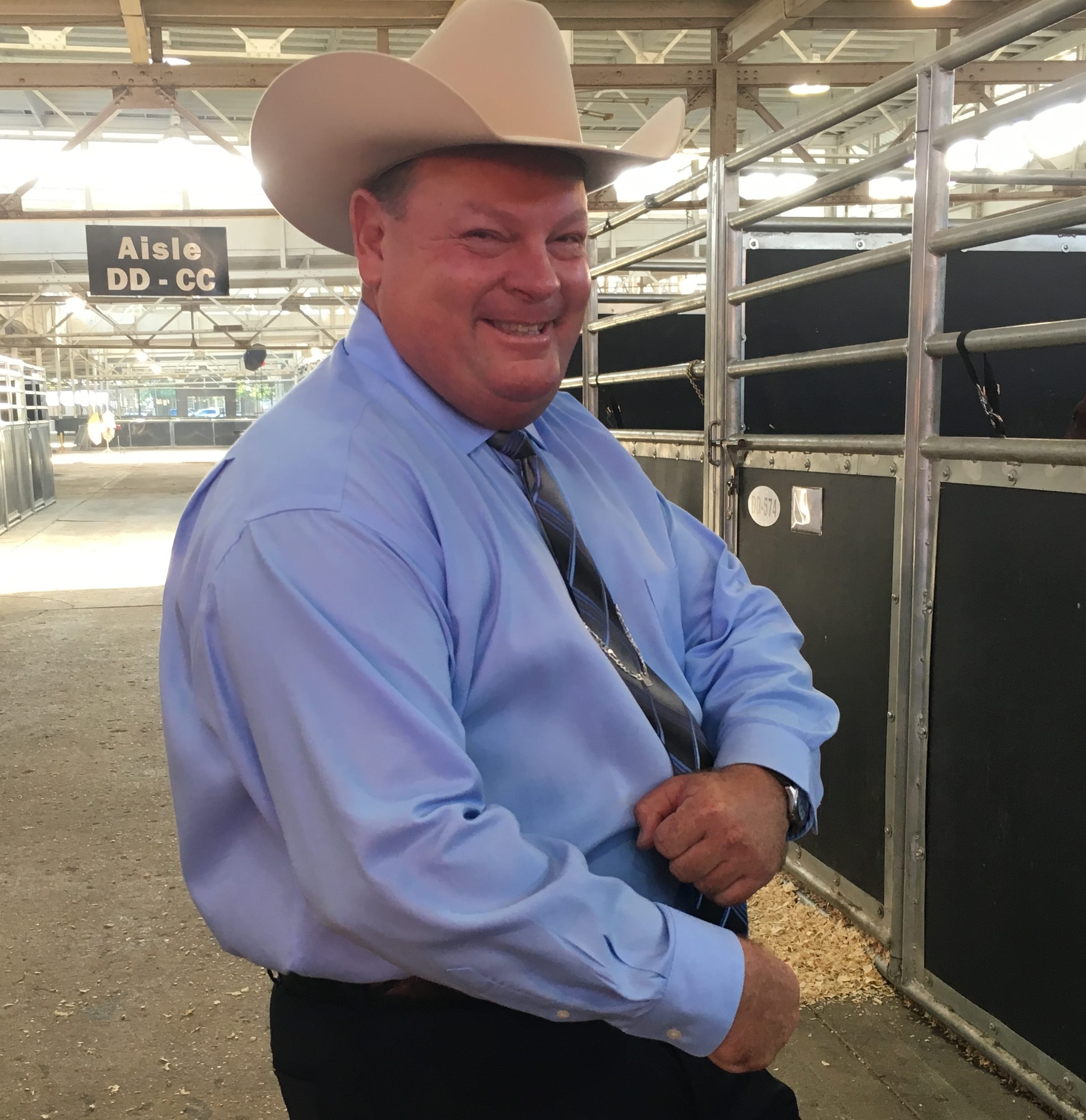 “All you can do is your best; a lot of people get mad if they get beat – it’s one man’s opinion that day. Don’t get frustrated or discouraged over one show,” Laney says (pictured left).
“All you can do is your best; a lot of people get mad if they get beat – it’s one man’s opinion that day. Don’t get frustrated or discouraged over one show,” Laney says (pictured left).
Harris agrees and wishes his customers could read his mind to see how proud he is of each of their accomplishments. He urges exhibitors to stop panicking. “I wish they could see themselves through my eyes; that would allow them to remain calm and go in the pen knowing they have one job to do and to have fun. Because at the end of the day, no matter where you are, a horse show is a horse show. The only goal is to have it be better than the last time.”


